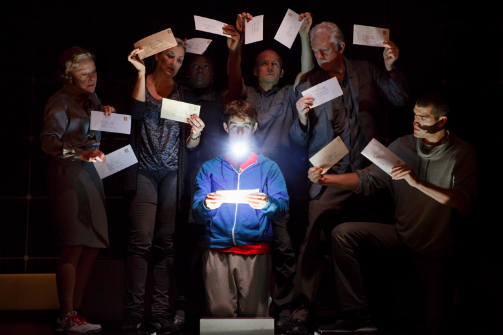
The Curious Incident of the Dog in the Night-Time
Written by Simon Stephens; Adapted from the book by Mark Haddon
Directed by Marianne Elliott
Broadway, New Play
Open-ended run
Ethel Barrymore Theatre, 243 West 47th Street
by Jack Smart on 10.5.14
 Helen Carey, Mercedes Herrero, Jocelyn Bioh, Alex Sharp, Richard Hollis, David Manis, and Ben Horner in The Curious Incident of the Dog in the Night-Time. Photo by Joan Marcus.
Helen Carey, Mercedes Herrero, Jocelyn Bioh, Alex Sharp, Richard Hollis, David Manis, and Ben Horner in The Curious Incident of the Dog in the Night-Time. Photo by Joan Marcus.
BOTTOM LINE: Powerful visual language turns an idiosyncratic perspective into a stirring and imaginative theatrical adaptation.
Christopher, the 15-year old narrator of Mark Haddon’s 2003 novel The Curious Incident of the Dog in the Night-Time, does not see the world the way most people see it. The book’s first-person perspective allows readers an intimate glimpse into the mind of someone who would in diagnostic terms be dubbed a high-functioning autistic teenager. How lucky -- and how extraordinary -- that the stage can transport an entire audience into that visceral, chaotic, and incredibly distinct mindset, and challenge not only our awareness of such disorders, but also the limits of theater itself.
Most responsible for the power of Curious Incident’s stage adaptation, opening October 5th in a Broadway transfer from London’s National Theatre, are surely its designers. Paule Constable’s lighting and Finn Ross’ video design in particular offer proof that theater and visual technology can together elevate a story to dazzling heights. Three towering walls depicting a mathematician’s grid double as a kind of LED grid on steroids, projecting the multitudinous contents of Christopher’s brain everywhere; constellations, diagrams, and maps materialize above and around the actors. For those of us accustomed to high-concept designs involving little more than an impeccably detailed set or elaborate costumes, this show’s breathtaking effects never get old. This is particularly true during Christopher's harrowing journey on the London Underground. You may never carelessly step into a subway car again.
Playwright Simon Stephens includes most of the elements from Haddon’s book, which, other than said Underground journey and the garden fork-skewered pooch referenced in the title, offer little in the way of plot. Christopher (Alex Sharp, in a staggering Broadway debut) spends the first act trying to solve the mystery of Wellington the dog’s murder, and the second enmeshed in domestic disputes he can’t comprehend. As someone who decries metaphor (“I think it should be called a lie, because a pig is not like a day and people do not have skeletons in their cupboards”), and who cannot process stimuli in a cursory, big-picture manner, our hero is aware of -- but not fully attuned to -- the grown-up issues and secrets surrounding him.
Nowhere is this phenomenon more clear than the tremendous scene in which Christopher, nestled in a sleeping bag within a pool of light, hears his parents arguing outside the room, stomping through the darkness like passing nightmares. That one of the show’s most astonishing effects is also its simplest says something about director Marianne Elliott’s visual vocabulary. Scott Graham and Steven Hoggett’s choreography lends hits like Once and Blackwatch a refreshing approach to movement in storytelling, but here perhaps their reputation precedes them. The fluid motions that so effortlessly channeled Tom’s act of remembering in John Tiffany’s The Glass Menagerie here feel comparatively tame, and therefore redundant. Elliot’s direction is less clouded when it’s grounded in realistic character work and the set’s many surprises.
What’s most remarkable is that she can immerse us in Christopher’s idiosyncratic viewpoint yet still render the supporting characters in his life as fully fleshed-out people. By conceiving the entire production around the visual representation of the protagonist’s impairments, Stephens and Elliot risk jeopardizing the connection between non-autistic characters and the audience. But we read their minds and feel their hearts anyway. Hovering on the fringes of Christopher's experience are his father (Ian Barford), mother (Enid Graham), and school counselor (Francesca Faridany), who each offer peeks into their perspectives: a frustrated sigh here, a wringing of the hands there. Every tiny moment helps us piece together their stories, and it’s in no small part due to the work of this terrific cast.
Ultimately, Curious Incident’s flashy, atmospheric design is what makes its story linger and resonate. If you like your theater theatrical, this is the show for you.
(The Curious Incident of the Dog in the Night-Time plays at Ethel Barrymore Theatre, 243 West 47th Street, in an open run. Performances are Tuesdays and Thursdays at 7PM; Wednesdays, Fridays and Saturdays at 8PM; Wednesdays and Saturdays at 2PM; and Sundays at 3PM. Tickets are $27-$139 and are available at telecharge.com or by calling 212.239.6200.)

